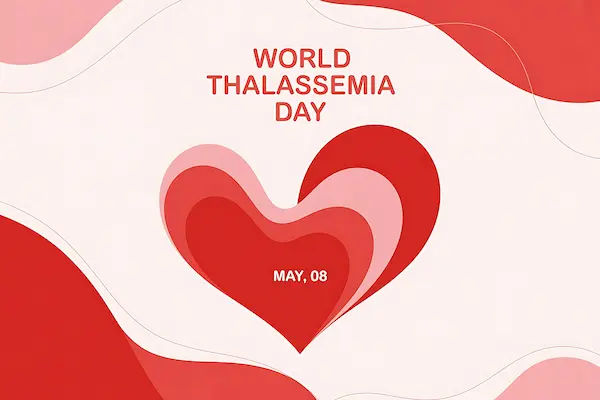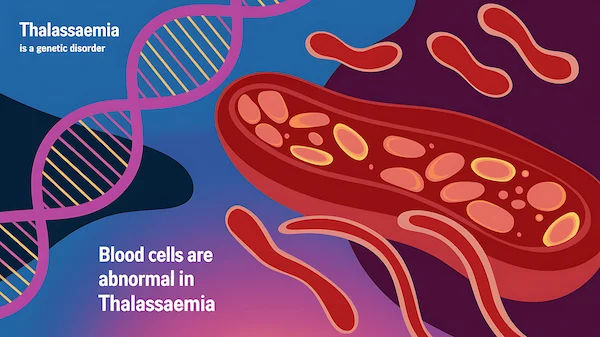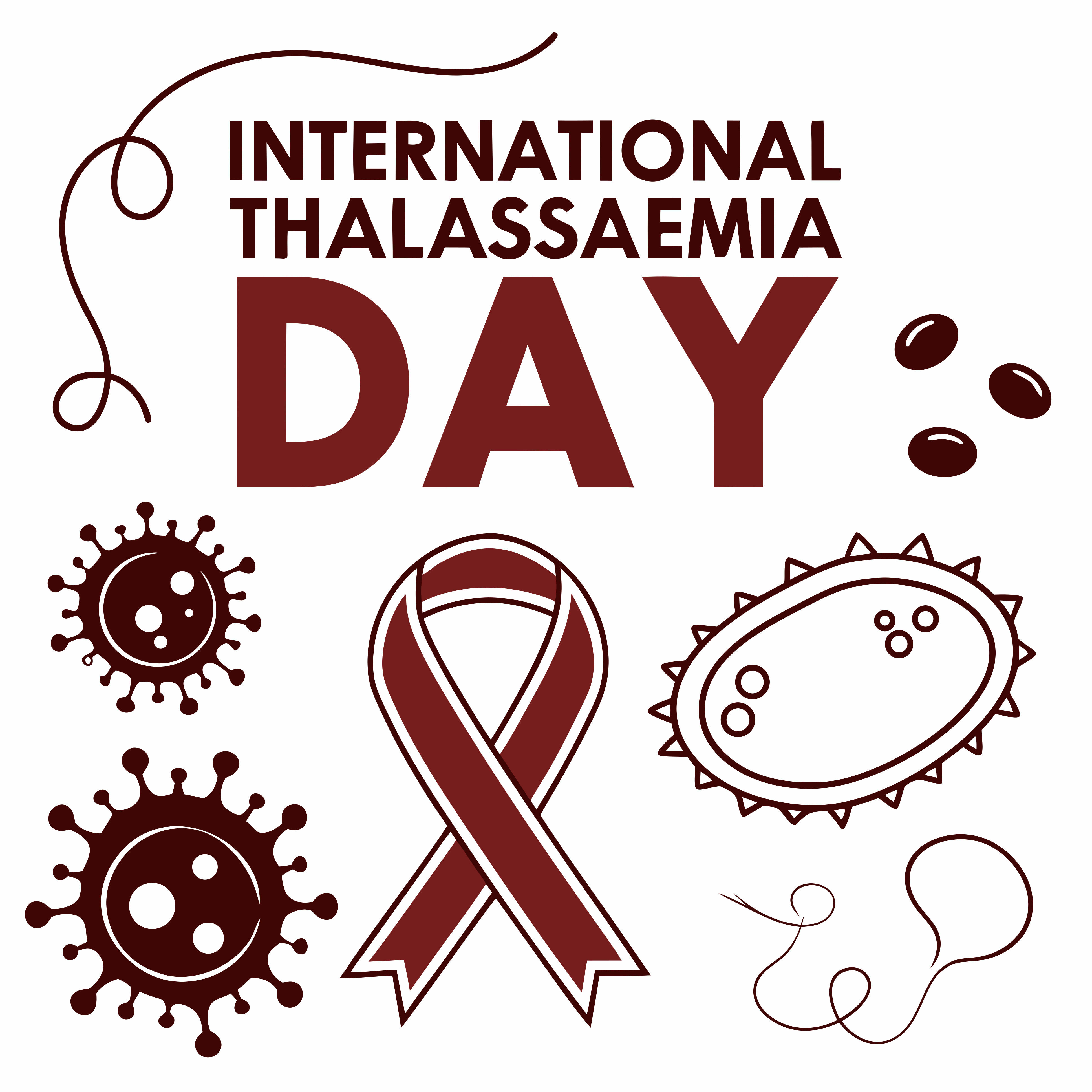Thalassemia Types and Their Characteristics
Learn about the different types of thalassemia, alpha and beta including their causes, symptoms, and severity levels. Understand how each type affects red blood cells and overall health.

Written by Dr. Dhankecha Mayank Dineshbhai
Reviewed by Dr. Rohinipriyanka Pondugula MBBS
Last updated on 13th Jan, 2026
.webp?tr=q-80,f-webp,w-350,dpr-2,c-at_max 700w)
Thalassemia is a genetic blood disorder that affects the body’s ability to produce hemoglobin, the protein in red blood cells that carries oxygen. People with thalassemia may experience anemia, fatigue, and other complications due to insufficient or abnormal hemoglobin production.
This article explains the different types of thalassemia, their characteristics, and how they affect health. We’ll also discuss ways to manage the condition and when to seek medical help.
What is Thalassemia?
Thalassemia is an inherited condition, meaning it is passed down from parents to children through genes. It affects the production of hemoglobin, which consists of two proteins: alpha-globin and beta-globin. Depending on which part of hemoglobin is affected, thalassemia is classified into two main types:
1. Alpha Thalassemia (affects alpha-globin production)
2. Beta Thalassemia (affects beta-globin production)
Each type has different subtypes, ranging from mild to severe.
Consult top Hematologist
Types of Thalassemia and Their Characteristics
Here’s a clear and informative overview of types of thalassemia and their characteristics:
1. Alpha Thalassemia
Alpha thalassemia occurs when there is a defect in the genes responsible for making alpha-globin chains. The severity depends on how many genes are affected:
a) Silent Carrier (1 gene affected)
Characteristics: No symptoms, normal hemoglobin levels.
Effect on Health: Usually harmless; the person is a carrier but doesn’t have the disease.
b) Alpha Thalassemia Trait (2 genes affected)
Characteristics: Mild anemia, small red blood cells (microcytosis).
Effect on Health: May cause slight fatigue but generally doesn’t require treatment.
c) Hemoglobin H Disease (3 genes affected)
Characteristics: Moderate to severe anemia, enlarged spleen, jaundice.
Effect on Health: Requires regular monitoring and occasional blood transfusions.
d) Alpha Thalassemia Major (4 genes affected – Hydrops Fetalis)
Characteristics: Most severe form, usually fatal before or shortly after birth.
Effect on Health: Babies with this condition rarely survive without medical intervention.
2. Beta Thalassemia
Beta thalassemia occurs when there is a defect in the beta-globin gene. The severity depends on how much beta-globin is produced:
a) Beta Thalassemia Minor (Trait – 1 gene affected)
Characteristics: Mild anemia, small red blood cells.
Effect on Health: Usually no symptoms; may be mistaken for iron deficiency.
b) Beta Thalassemia Intermedia (Moderate – Both genes partially affected)
Characteristics: Moderate anemia, bone deformities, enlarged spleen.
Effect on Health: May need occasional blood transfusions.
c) Beta Thalassemia Major (Cooley’s Anemia – Both genes severely affected)
Characteristics: Severe anemia, fatigue, bone deformities, growth delays.
Effect on Health: Requires lifelong blood transfusions and iron chelation therapy.
How Thalassemia Affects Health
Thalassemia can lead to:
Anemia (low red blood cell count, causing tiredness and weakness).
Iron overload (due to frequent blood transfusions, damaging organs).
Bone deformities (due to bone marrow expansion).
Growth delays (in children with severe forms).
Enlarged spleen (which may need surgical removal).
Managing Thalassemia
While thalassemia is a lifelong condition, proper management can improve quality of life. Here are some tips:
1. Medical Treatments
Blood Transfusions: Needed for severe cases to maintain hemoglobin levels.
Iron Chelation Therapy: Helps remove excess iron from the body.
Folic Acid Supplements: Supports red blood cell production.
Bone Marrow Transplant: A potential cure for some patients.
2. Diet and Lifestyle Changes
Iron-Rich Foods (in moderation): Too much iron can be harmful for transfusion-dependent patients.
Calcium & Vitamin D: Supports bone health.
Avoid Infections: Get vaccinated and maintain hygiene.
Regular Exercise: Helps improve energy levels (but avoid overexertion).
3. Genetic Counseling
If you or your partner carry thalassemia genes, consult a genetic counselor before planning a pregnancy.
When to See a Doctor?
If you or your child experience:
Persistent fatigue or weakness
Pale or yellowish skin
Slow growth (in children)
Frequent infections
It’s important to get tested. Apollo 24|7 offers genetic testing and consultations with hematologists to help diagnose and manage thalassemia effectively.
Conclusion
Thalassemia is a manageable condition with the right medical care and lifestyle adjustments. If you suspect you or a family member may have thalassemia, consult a doctor for proper diagnosis and treatment.
Consult top Hematologist
Consult top Hematologist

Dr Abilash Jain
General Physician/ Internal Medicine Specialist
12 Years • MBBS,DNB(FM),MNAMS,FIAMS,CCGMG(GERIATRICS),DGM (GERIATRICS),PGCD(DIABETES,BOSTON UNIVERSITY),FID(DIABETICS UK)CCEPC(PALLIATIVE CARE),CCCC(CRITICAL CARE)
Visakhapatnam
Apollo Clinic Vizag, Visakhapatnam

Dr.sanchayan Mandal
Medical Oncologist
17 Years • MBBS, DrNB( MEDICAL ONCOLOGY), DNB (RADIOTHERAPY),ECMO. PDCR. ASCO
Kolkata
Dr. Sanchayan Mandal Oncology Clinic, Kolkata

Dr. E Prabhakar Sastry
General Physician/ Internal Medicine Specialist
40 Years • MD(Internal Medicine)
Manikonda Jagir
Apollo Clinic, Manikonda, Manikonda Jagir
(150+ Patients)

Dr. Prabu P
Haematologist
29 Years • MBBS, MD(Gen.Med.)(JIPMER) , MRCP, Dip RCPath, FRCPath, CCT(U.K), Haemato - Oncology.
Chennai
Apollo Hospitals Greams Road, Chennai
(550+ Patients)

Dr. Ramalinga Reddy
General Physician
5 Years • MBBS MD General medicine
Bengaluru
PRESTIGE SHANTHINIKETAN - SOCIETY CLINIC, Bengaluru


.webp)

